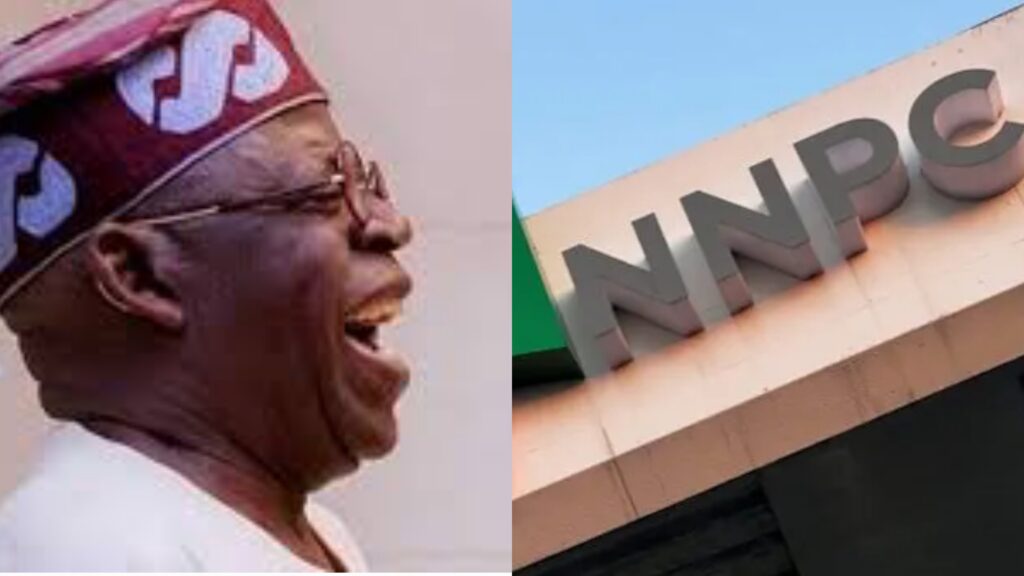
LAGOS, Nigeria – Amid an intense economic hardship in Nigeria, President Bola Tinubu’s government, through the state-run Nigerian National Petroleum Company (NNPC) Limited has increased pump price of premium motor spirit, popularly known as petrol.
This increment will see residents in the commercial hub Lagos and the capital Abuja buy petrol for ₦1,025 and ₦1,060 per litre respectively.
In early October, petrol prices stood at ₦1030 in Abuja, ₦998 in Lagos in NNPCL outlets, while other petrol stations sold for between ₦1, 150 and ₦1200 per litre.
NNPCL petrol stations displayed the reviewed price at their various stations in Lagos and Abuja on Tuesday.
NIGERIA ECONOMY CRISIS
Last week, a white man was filmed on the street of Lagos, distributing loaves of bread to residents who queued for the free staple, in a development that highlights the extent to which citizens were battered by hunger amid the nation’s worst cost-of-living crisis under President Bola Tinubu-led Nigerian government.
A video that went viral on Monday, showed apparently hungry persons packing what looked like noodles and spaghetti, despite being mixed with dirts in the northwestern state of Kaduna.
A moving trailer conveying the food reportedly capsized, and packs of noodles and spaghetti were scattered on the road, with residents storming the scene and thanking God for providing for them, according to voices behind the video.
Nigeria’s headline inflation rate in September 2024 rose to 32.70%, up from 32.15% in August 2024, marking a 0.55% increase month-on-month, according to the National Bureau of Statistics (NBS).
The country is facing its worst economic crisis in decades, with skyrocketing inflation, the national currency in free-fall and millions of people struggling to buy food. Only two years ago Africa’s biggest economy, Nigeria is projected to drop to fourth place this year.
The pain is widespread. Unions strike to protest salaries of around $20 a month. People die in stampedes, desperate for free sacks of rice. Hospitals are overrun with women wracked by spasms from calcium deficiencies.
Although, Tinubu increased the minimum wage — after strike action and months-long negotiations with labour unions — from ₦30,000 to ₦70,000, his government has increased spending for officials at a time of nationwide starvation.
For workers earning the new ₦70,000, or $43 per month minimum wage, capricious inflation and naira value have inflicted too much damage for the changes to make any difference in their lives.
The crisis is largely believed to be rooted in two major changes implemented by Tinubu, who took over office 17 months ago; the partial removal of fuel subsidies and the floating of the currency, which together have caused major price rises.
Over a year after Tinubu declared end to fuel subsidy, the fuel price which had been hiked a few times during his first year in office, officially hit the ₦1,000 mark in early October.
This follows after the NNPC Limited withdrew from being middleman between the oil marketers and the Aliko Dangote-owned refinery for the supply of fuel.
Dangote had also urged the president to fully hand off fuel subsidy.
In recent weeks, the nation has suffered an acute fuel scarcity that led some outlets with fuel to sell at exorbitant prices above ₦1,100 per litre while black market prices exceeded ₦1,300.
A nation of entrepreneurs, Nigeria’s more than 200 million citizens are skilled at managing in tough circumstances, without the services states usually provide. They generate their own electricity and source their own water. They take up arms and defend their communities when the armed forces cannot. They negotiate with armed kidnappers when family members are abducted.
But right now, their resourcefulness is being stretched to the limit.
Police and other security agencies clamped down on protests after citizens frustrated by the high cost of living repeatedly took to the streets, demanding that the government do more to help the vulnerable.
In August, Amnesty International accused Nigerian security forces of killing at least 21 protesters during a week of economic hardship protests.
Security forces denied responsibility for deaths during the protests.
